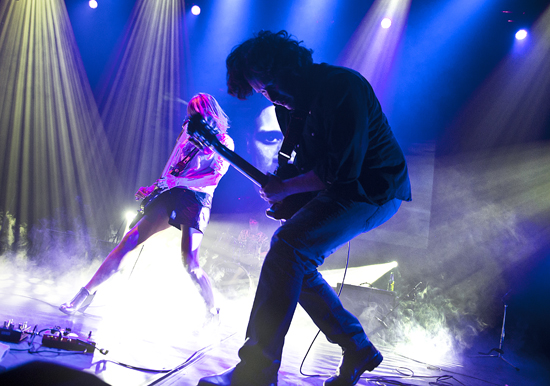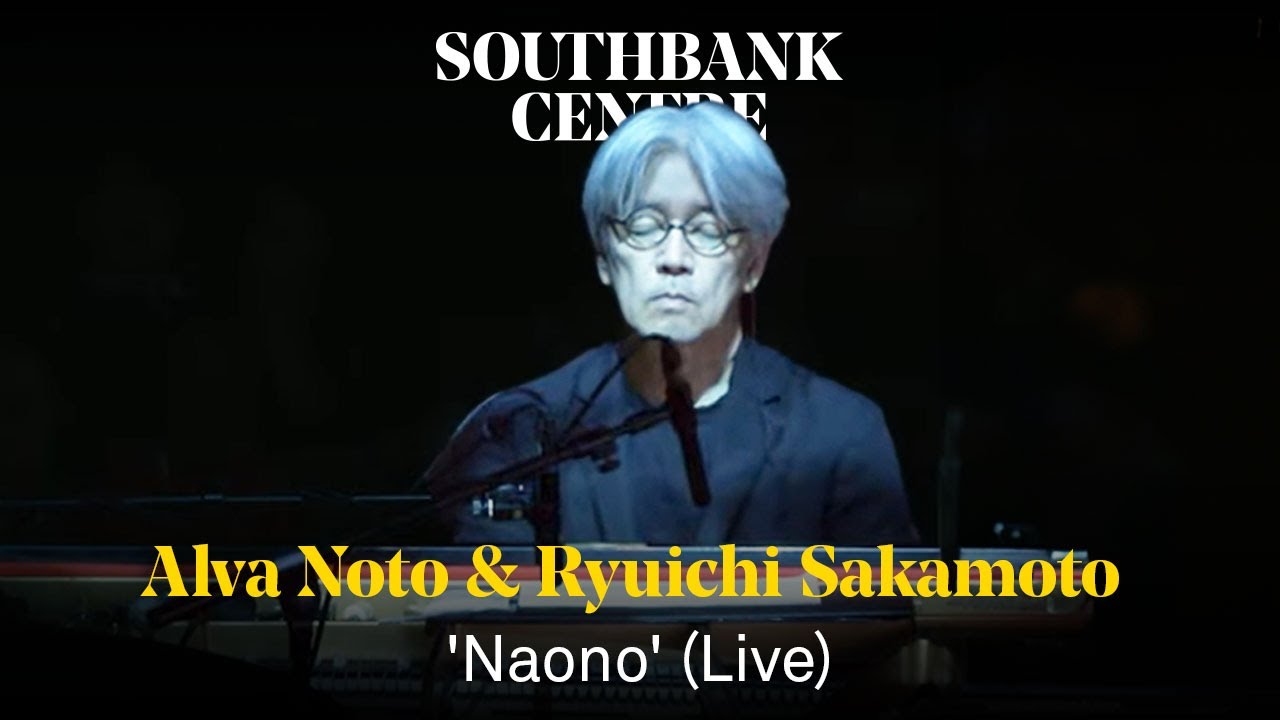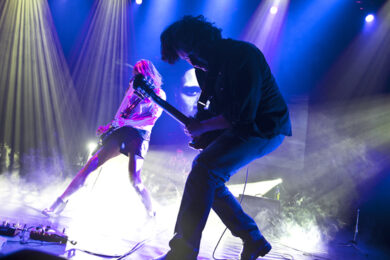Yoko Ono Plastic Ono Band
Royal Festival Hall, June 14
We’re greeted by a screenload of giant arses, varying in hairiness, filmed in ambling motion. This, I’ll go out on a limb and guess, is Yoko Ono’s notorious short film, No. 4, better known as Bottoms. We are at least spared her slo-mo study of John Lennon’s partly engorged cock, of which she remarked that "The critics wouldn’t touch it." She’s rather droll, is Yoko.
It took me a while to get that, and I’m not alone. One of the many advantages of outgrowing Beatles fanboydom is that, while you enjoy the band no less, you appreciate Yoko Ono more. The ‘squawking demon woman’ mythologically blamed for breaking up the Fab Four and ruining all those Lennon records becomes the squawking demon woman who did great stuff precisely because that was her persona. If this is what you make me, she replied to the world, that is what I’ll make into my art. It’s strong medicine, more so than her whimsical Fluxus work, and best represented in her music. Lennon was right all along. He wasn’t doing her any favours; he was utilising her voice, her imagination, her presence, because he knew the power they possessed. And when she stands alone, so do they.
There she is, a tiny figure in Merry Prankster black and customary sunglasses. And there’s the Plastic Ono Band, which wasn’t named for its ever shifting line-up and nature – it’s now the amiable Sean Lennon and pals – but could have been. Likewise, for the way its sound drapes itself over the auditorium like a melting Dali clock, slow and heavy as time.
Amid this treacly flow of noise, Ono might as well be singing in another language. Her words break through only intermittently, giving her the air of an avant-garde Norman Collier, which is an altogether splendid thing. Half of them would appear to be "Peace", or "Earth", so we’re not missing a great deal there. It’s the witchy cackles, the keening, the shrieks that bite and carry. Her spell lies not in passing off a formless experimental din as pop music, but the reverse trick. ‘Walking On Thin Ice’, on this showing, should be played in clubs more often. If this isn’t what !!! have been reaching for, it ought to be. ‘Don’t Worry Kyoko’ now grooves like the mid-point between ‘Sympathy For The Devil’ and ‘Loaded’. This is Pop As She Is Ululated. Ono’s sly undermining of expectations is thrown into sharper contrast by a guest turn from Peaches, subtle as a bludgeon to the breadbasket.
Yoko Ono is 80 years old, and patently does not give a damn. This is always endearing in the elderly; but, lifetime hipster that she is, she was not giving a damn before you and I were born, when it was harder to get away with it. If she’s lately regarded with affection, she’s bloody earned it. David Bennun
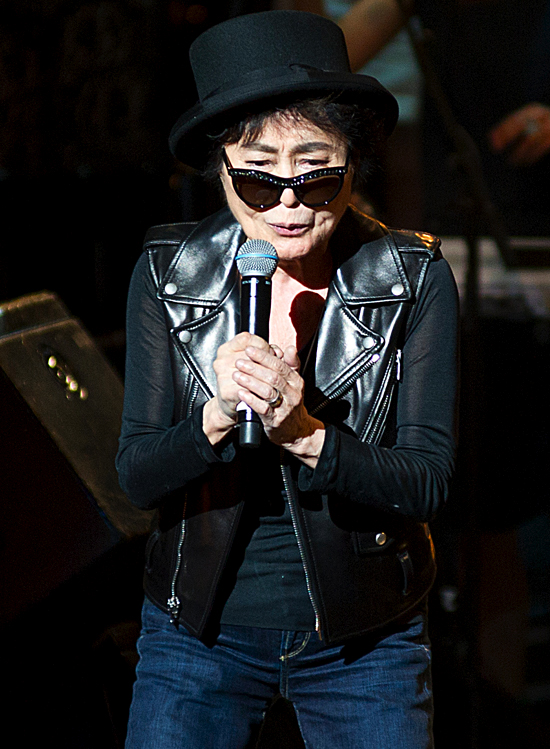
Yoko Ono
Cibo Matto
Queen Elizabeth Hall, June 15
"Oh my god, what happened London? The food? You guys did a good job!"
Miho Hatori seems pleased to find that London has transformed from the sooty Victorian wasteland it was at the end of last century into the futuristic, cosmopolitan melting pot we all now know and love. Indeed, since the 90s, the entire world has in many ways grown into a more suitable home for Cibo Matto – yet it would seem they’ve refused to change one little bit. The Japanese expat duo of Yuka Honda and Miho Hatori were fairly novel upon their emergence, yet bands writing pop songs backed with little more than a sampler and a keyboard have steadily become a mainstay on both sides of the Atlantic in recent years. Cibo Matto disbanded just as the post-millennial, Strokes-led resurgence in guitar music was taking hold in their home city of New York, yet this first London gig in 14 years offers proof that their disjointed hip-pop holds more appeal and relevance now than at any time previously.
The group’s founding pair – keyboard-and-samples maestro Honda with vocalist Hatori – take to the stage as a duo. An introductory run through of favourites ‘Beef Jerky’ and ‘Sugar Water’ is all charismatic cosmo-cool. Be-sunglassed á la Keiji Haino and be-fringed á la Debbie Harry, Hatori ably switches between B-Boy rap and quivering J-Pop warble, Honda moodily manning the keys to her right. The gentle trip-hop beat and operatic sampling of ‘Sugar Water’ has certainly lost none of its appeal since soundtracking countless mid-90s chillout rooms, but the rest of the gig proves guiltily fun in comparison. Next comes ‘Spoon’ from Stereo ☆ Type A, seeing the group’s rhythm section appear onstage mid-song to dramatic effect.
The remainder of the set is full of surprises. Guest appearances from both Yoko Ono and her son, Sean Lennon, light up the evening. Lennon duets with Hatori, turning ‘Moon Child’ into a soaring duet of decadent alt-pop wizardry, while Ono arrives for a climactic run through of gibberish anthem ‘Know Your Chicken’. Fittingly donning a ring-leader’s hat and tails (well, it is her Meltdown, isn’t it?), Ono struts between Honda and Hatori, periodically yelling "I know my chicken!" at the top of her voice. Who knew the Dragon Lady was part Flavor Flav?
At one point announcing their new album’s title as Tenth Floor Ghost Girl, the group include a trio of new songs: the dissonant-yet-funky title track, effortlessly catchy ‘Motherfucking Nature’, and mashed-italo-disco of ‘Check In’. These hold their own against the old material.
Cibo Matto are so tough to dislike. Banal and everyday subject matter beget addictive multicoloured pop, and their music resists any analysis. The duo’s inherent charm overrules any potential banality, while Honda’s knack for choice sounds has prevented them from aging. Few artists can maintain integrity yelling, "a horse’s ass is better than yours", yet Cibo Matto manage it. And it’s a joy to watch. Tristan Bath
Watch a video of Cibo Matto’s entire Meltdown gig here
Immortal Technique
Royal Festival Hall, June 16
There’s a fine line between focused, politically useful anger and nihilism, and on his records the unrepentantly militant Harlem MC Immortal Technique can occasionally seem to cross it. Since Revolutionary Volume 1, released three days after 9/11 as if to herald the geopolitical and financial chaos that has subsequently engulfed the globe, his music has railed with such force at the Western military-industrial complex that it can seem as if the target isn’t quite large enough to contain the bile. On one level, admittedly, this is effective. Amplifying the hostility can serve as the slap in the face necessary to make the listener realise that Technique’s political rationale is not only serious, but urgent: it’s a justifiable form of attention-seeking, perhaps.
All this makes it a little surprising to see the rapper come on stage to a welcoming audience of SOAS politicos and present himself not as an uncompromising, fire-breathing avenger of Che and Patrice Lumumba, but as a reasonably relaxed guy who just fancies a little chat about the developing world and other loci of gross inequality. The anger is visible, but it’s targeted, not sparking off unpredictably as it appears to in the studio. A rendition of heart-in-mouth ghetto morality tale ‘Dance With The Devil’ takes us closest to Technique’s nightmare world, but otherwise there’s something disconcertingly good-time and matey about it all. That said, it works: his live shift into a more communicative position allows for the clarification and elaboration of the message, and is probably preferable to the hip-hop G.G. Allin the songs portray on record. As the friend I’m with has it, he’s ‘delectably angry’, rather than murderously so. Joe Kennedy
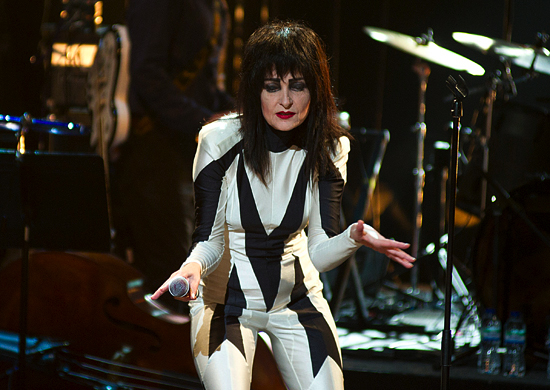
Siouxsie
Siouxsie
Royal Festival Hall, June 17
As she strides imperiously to centre stage after five years absence, there is a rush to the front, long presaged by howls of anticipation. The limp security employed by this very establishment venue and caught off guard by the surge needn’t have worried – entrancing them with her danse macabre, this dominatrix can discipline her flock. Tonight was always partly about context, the invitation to perform being issued by one undisputed radical feminist icon, Yoko Ono, to arguably another. However the beguiling charm of support Viv Albertine’s songs of maturing experience is over; Siouxsie’s sole reference to time’s march is to drolly remark, her marble features glistening with sweat, that "vinyl’s always been hard work… even at 18".
Anyone expecting a lush, multi-instrumental stage production such as she and fellow Banshee/Creature Budgie gave from this stage for 2004’s Dreamshow might be disappointed. Framed by strangely familiar descending Venetian blinds, the stripped back band (Severin, even Budgie, sadly in absentia) launch into the glorious, oxymoronically sullen euphoria of ‘Happy House’ and the dandy crowd up front goes wild – and stays that way. But as the set progresses momentum sags, imperceptibly given the strident conviction of Sioux’s demented Deitrichian delivery, and the realisation dawns that this is a track-by-track rendition of 1980’s third Banshees LP Kaleidoscope.
There are compelling reasons, beyond the thrilling opener, to choose an album which bridged their livid early phase (‘Trophy’, another loathe-letter to recumbent suburbia) to the doomy psychedelic shimmer that would define them and resonate on through alternative and mainstream pop (‘Christine’). Unheeding sonic experimentation and sheer punk attitude set them apart from the new wave pack, but the Banshees were still cherry-picking amongst the front ranks of post-punk innovation for their own identity: creative peaks such as ‘Juju’ or ‘A Kiss In The Dreamhouse’ lay ahead. ‘Lunar Camel’ is pastiche Young Marble Giants, whilst the spectre of Human League Mk1 stalks ‘Red Light’. The latter number, nonetheless, remains Susan Janet Ballion’s most explicit venting of feminist spleen.
With the hallmark of today’s pop stardom seemingly a modeling contract for consumer product and the lines in today’s porniferous culture more dangerously blurred than ever, it’s gratifying to catch sight of someone whose art has always been sovereign and whose example stretches even beyond gender and sexual politics to something tantalisingly… other. The encore’s hurtling ‘Spellbound’, occult ‘Israel’ and recent transmogrification drama ‘Into A Swan’ splendidly testify to that fact. Maddy Sparham
Julianna Barwick + Patten
Purcell Room, June 18
The double bill for this warm and muggy evening might seem rather incongruous. But there’s a pleasing yin-yang quality to tonight’s performances, with the all-encompassing overload of Patten playing perfect foil to Julianna Barwick’s soothing choral work. Patten plays in near-darkness, grooving away on electric guitar to grooveless rhythms, singing lines that are all but imperceptible under the swampy mire of his equipment. His brand of intense post-IDM noisetronica is stuffed to the point of sounding like the entire Warp Records catalogue playing at the same time. This isn’t placated by the mulchy visual display showing a barrage of fractal patterns, ’80s television adverts and pottery being smashed to the floor (only to inevitably reform) in slow motion.
It’s all laid out in such a deliberately haphazard fashion that it can be rather startling during those rare moments when the music and the visuals do appear to sync up. But if this all sounds a bit familiar, you’d be correct. Too often it feels like we’re being treated to a parody of electronic music which never quite transcends the absurdist collage aesthetic made popular in recent years by the likes of James Ferraro, Black Dice, Oneohtrix Point Never and Richard Dawkins.
Still a bit woozy following Patten’s onslaught, the contrast couldn’t feel greater by the time Julianna Barwick hops from behind the stage curtain with a timid “Hey everyone!” and proceeds to sing. Bathed in blue light with a flood of dark hair shielding her face, Barwick’s heavenly vocal harmonies have a breezy, cooling effect on the room like a window being opened. Some songs feature sampled instrumentation, but it’s her remarkable ability to sample and loop her live vocals that enthrals here. While tools have always been used to create music, there’s a dawning realisation of an extraordinary symbiosis between humanity and technology at play here. Without a full choir in tow, this otherwise purely human form of music wouldn’t be achievable by a single person without being attached to a microphone, reverb unit and looping device. As such, dozens of replica Juliannas are allowed to exist within a single human-machine interface, a synergy that is at once utterly traditional and totally futuristic. Charlie Frame

Peaches
Peaches Christ Superstar
Queen Elizabeth Hall, June 19
It’s amazing how right something that sounds so wrong could be. A Jewish-born lesbian who’s appeared in Hustler magazine as the sexually provocative Peaches, performing the entire vocal score of Andrew Lloyd Webber’s rock opera Jesus Christ Superstar, wearing white spandex, under a single stark spotlight. My mum would be horrified.
What surely would have started as an absurd hypothetical among friends, now dubbed Peaches Christ Superstar, is actually being realised at a cultural institution in London and some attendees who purchased tickets for the show, billed as the performer singing songs from her back catalogue, are no doubt waiting for the moment her band would come out screaming "Fuck the Pain Away!" and things would begin in earnest. Instead, it’s a handful of pre-selected audience members shouting, "Crucify him!" from their seats and loudly counting down to the 39 lashes, at Peaches’ signal, during her rendition of ‘Trial Before Pilate’. She’s even stripped the "rock" from the "opera" and replaced the cocky glam score with a solo piano, played by a slight blonde performer.
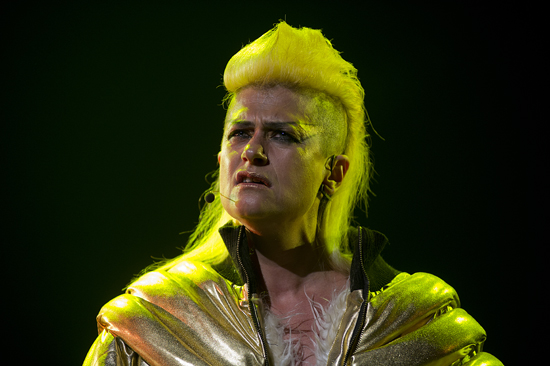
Peaches
Eventually switching to a bright gold and puffy number resembling a Roman Catholic monstrance, Peaches’ Merril Nisker is running through every single musical number to an audience who are mostly respectful, some visibly pissed off as they storm out in the interval or scowl, embarrassed, at the banshees among them shouting when instructed – and it couldn’t be more perfect. Here is the 46-year old Berlin-based performer who already smashed boundaries by infiltrating popular culture with her provocative lyrics and outrageously unkempt bikini line in the early 00s, now in the seated venue of Queen Elizabeth Hall testing the limits of her very own fanbase by belting out song after song across an impressive vocal range. Her voice only gives way near the end but, in keeping with the ever-sobering mood of the narrative, it only serves to strengthen its poignant conclusion.
It might well sound absurd in theory, and there are certainly moments that elicit a healthy chuckle, such as her hip gyrations and moonwalking "across my swimming pool" in ‘King Herod’s Song (Try it and See)’, and a little strut to ‘Simon Zealotes’, but Peaches’ delivery and animation supersedes all logic to reveal a profound truth: Jesus was a misunderstood revolutionary. As Peaches chants, "What do we do about this Jesus mania?", the parallels between these two cultural icons are unmistakable. Steph Kretowicz

Alva Noto
Ryuichi Sakamoto & Alva Noto
Royal Festival Hall, June 19
Before they play, you’d expect a face-off: Ryuichi Sakamoto’s Yamaha grand in one corner, microphones poised over the strings like praying mantises, and on the other side of the stage, Alva Noto’s electronics stacked on top of a lurching white Corian iceberg of a table that looks like it’s escaped from Legoland. Romanticism versus tech? Organic versus digital? No way – when Sakamoto and Noto began working together, Sakamoto had come off a series of ‘Back to the Basics’ piano tours and Noto, with his Raster-Noton label, had taken recording and manipulation of sound to its technical limits. Their collaboration proves that opposition is boring when you can combine styles to achieve one hell of a complex palette, and then set the whole thing to a series of animated polygon and moiré visuals that, while no more sophisticated than screen savers, translate movement, pitch and timbre into a mesmerising second-level abstraction.
But their show is about place as well as screens: Noto’s application of sound at the high and low end hits the back of your neck or the pit of your stomach. Sakamoto excels at long passages of restraint followed by release through crescendo; it’s a cinematic style he’s been good at as far back as his YMO days, and tonight Noto boosts the impact of those points of release. At one point, Sakamoto leans so far into his piano that it looks as though it might swallow him, as he reaches to pluck its guts and tap grooved sticks against the sides, and some of Noto’s electronic sounds evoke creaky hinges of heavy doors, rustling leaves, water pooling over mossy rocks.
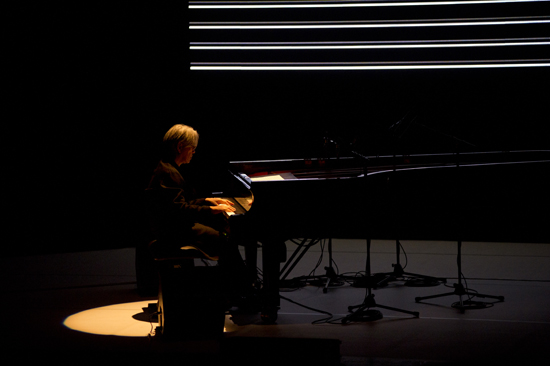
Ryuichi Sakamoto
Sometimes both play with textures that sound as clear and defined as some of Brian Eno’s generative music apps; an easy comparison, considering the geometric visuals, but Noto and Sakamoto’s performance avoids the ‘randomness’ that comes from some presets on Logic, or the repetition of performers playing against loops of themselves. A version of Eno’s ‘By this River’, with spinning, flashing wheels onscreen, proves an ideal first encore: jolts of glitch pricking against the flow, as the whole hall fills with white noise wave sounds at the high and low ends, with the Thames outside going about its business. Listening to the duo in the Festival Hall is enough to convert even the most reluctant audiophile to sell their worldly possessions in exchange for a high-end sound system with NASA-level engineering – and even that still wouldn’t compare with watching these guys on stage, facing each other. Emily Bick
Watch Alva Noto & Ryuichi Sakamoto perform ‘Naono’ at Meltdown
Body/Head ft Ikue Mori + Mystical Weapons
Queen Elizabeth Hall, June 21
With Iggy Pop and Savages on the Royal Festival Hall stage, Kim Gordon and Bill Nace’s Body/ Head – even with ex-DNA drummer Ikue Mori helping out – are budged into the Queen Elizabeth Hall. In addition to this, they’re being supported by Mystical Weapons, Sean Lennon’s latest project. There’s a temptation to psychoanalyse here, and indeed Lennon spends much of his performance behaving a bit like a kid taken on holiday against his will. He walks around the stage, pissing about with guitars and effects pedals, pulling a range of rock poses half-heartedly, as Deerhoof’s Greg Saunier batters away behind him. It’s not noise music proper, it suggests no conviction in heavy rock, so I assume the point Lennon’s trying to make is deconstructionist. The thing is, deconstruction has done its work, and it’s only a certain kind of depoliticised NY hipster who takes its terms uncritically these days.
That said, if you are going to stick with deconstruction, Gordon and Mori have done a far better job of turning its theory into practice than most. With Sonic Youth, Gordon’s mission seemed to be to draw an alternative history of rock in which its most perverse libidinal energies had been unfettered around Altamont – she drolly quotes a few lines of ‘1969’ tonight, as if to point to how the Stooges were ultimately only a containment – and Mori… well, the greatness of Ikue Mori as a percussionist has always been to sound exactly like a lengthy recording of pub-band drummers’ fuck-ups, only great. Both have consistently played in a way designed to highlight the aporias in so-called ‘alternative’ music, while producing records which are viscerally affecting on their own terms.
Even so, on stage tonight it’s hard not to wonder what happens when deconstructionists start to feel nostalgic for some original scene of deconstruction – the whole project is essentially contradictory. This is probably forgivable, though. It’s gripping in terms of volume alone, and Gordon and Nace are convincingly meaningful about it all. Yoko Ono joins them on stage for the last song: she feels like the obvious final component of the ensemble and, regardless of any critical reservation one might hold, it’s pretty difficult to reject as a spectacle. Joe Kennedy
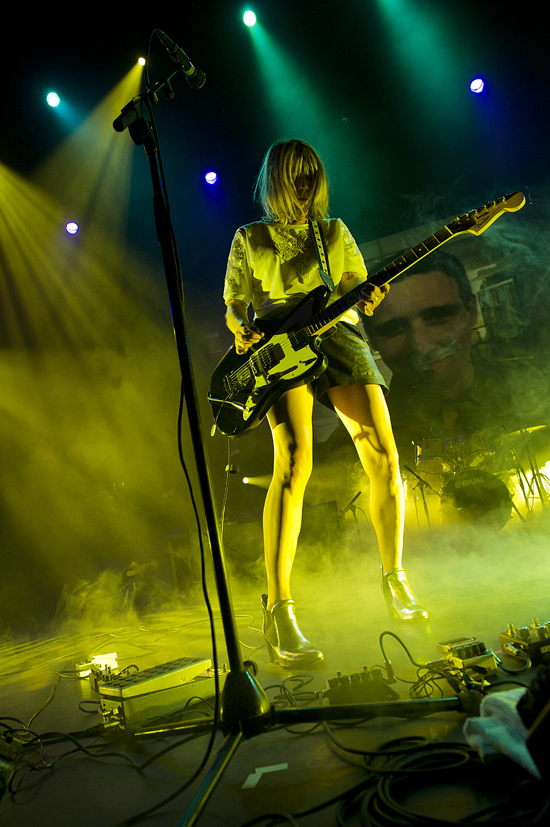
Kim Gordon
Deerhoof + Verity Susman
Queen Elizabeth Hall, June 21
Shaking off the working week with a reinvigorating shot of audio-visual art – the very essence of Yoko Ono’s Meltdown – Verity Susman puts the festival’s platform for performance to full use as she constructs her microcosmic world of queer sci-fi fantasy, gender play and drag, using a sonic call sheet of organ, saxophone, voice and electronics. Framed by descending shafts of ballroom blue-coloured light, the moustachioed Susman is still and totem-like as she straps on on her baritone sax. Jack Barraclough’s stunning collaged visuals are partnered perfectly with the cut and paste effect of Susman’s sound, as portentous, rolling thunderclouds set the scene.
Susman puckers up and loops elephantine sax skronks for a five-minute run before beats are added and percussion deepens gradually to a roar. There’s a beautiful ebb and flow to her voice, and an incredible range. But the show rarely assumes a human guise – instead, Susman slaps down feelings of discomfort, awkwardness and alienation onto cold, robotic surfaces, with sexualised text-to-voice software drilling the point home. There’s the occasional bit of absurd, laugh-out-loud humour, though: Susman’s first solo release, To Make You Afraid, sees quivering baroque organ set to an animation of giant lactating breasts bouncing away in the background. The show ends on an immersive, life giving, note, when she cranks up the volume and floods the cavernous hall with sound, and audience member Yoko Ono enthusiastically exclaims "I like it!"
Projecting the stance of a traditional rock four-piece in nothing more than outward appearance, Deerhoof explode onto the stage with all the tension of a tightly-coiled spring. King of the drum frontier Greg Saunier wrestles with a precariously assembled kit which threatens to collapse under the weight of his bone crushing fury. Throughout the band forever teeter on the edge of meltdown but just hold it together; carefully controlled pandemonium is Deerhoof’s speciality, after all. They do, however, revisit the spirit of The Rock Band momentarily, with the intro of 2008 track ‘The Tears Of Music & Love’, which for a moment brings to mind a classic rock riff before exploding into the atonal guitar interplay of John Dietrich and Ed Rodriguez. The duo present a gnarled meeting of minds: playing good cop bad cop, slaloming in and out of of ACME-style death scene wobbles, nails-against-chalkboard screeching and spaghetti guitar freak-outs.
Vocalist Satomi Matsuzaki is a focal point throughout, a ball of energy with no off-switch, her voice veering from the indie pop song to childlike yelp and funk-rock star, slinking around the grooves of ‘Flower’ as she cries "Let it go / leave it all behind." The enlivening stomp of ‘Giga Dance’, from 2004’s magnum opus Milk Man, ensures that almost all album bases are covered tonight, before things are brought to a buoyant conclusion with tonight’s choice encore: ‘Basketball Get Your Groove Back’, with its real-life props, knocks us all for six. April Welsh
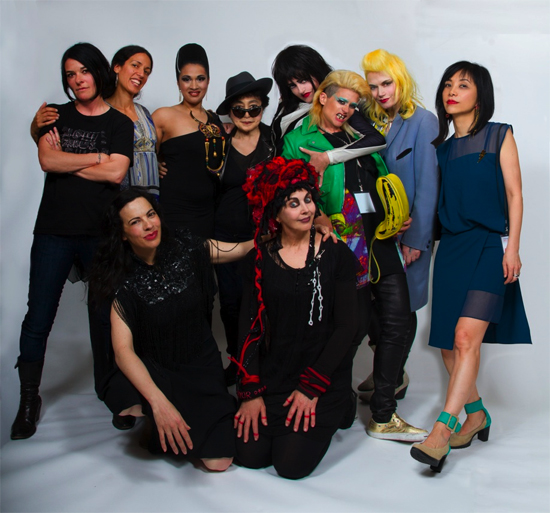
Photograph by Kate Garner
Patti Smith
Purcell Room, June 21
‘An Evening Of Words And Music With Patti Smith’ may not offer the primal energy of her full-band rock gigs, but displays why Smith’s peace is as invigorating as most others’ noise. Loose and improvisational, it sees the dignified Smith alternating poems, readings and anecdotes from her Just Kids memoir with acoustic renditions of songs. She’s accompanied by her own two kids, Jackson on guitar and Jesse on piano, and there is likeable banter between the three, of the "Oh mum, you’re so embarrassing, really?" variety. The playing is imperfect, and one screw-up as she comes back in for the dramatic middle eight in ‘Because The Night’ finds her cracking up in hilarity. After a brief debate as to how to restart, having joked about her one-hit wonder status, she says, "Aw, c’mon, this is my big moment."
There are well-crafted anecdotes about meetings with Allen Ginsberg (who chatted her up and bought her a coffee, thinking she was a very pretty boy – "He fed me when I was hungry", she concludes benignly) and Sam Shepard (she had just shoplifted two steaks from a supermarket when they met, and was worried they’d go off in her pocket as he spoke). There’s a recollection of dressing up with Robert Mapplethorpe on New Year’s Eve 1969 and vowing, "This is our decade." Tales of writing the lyrics to ‘Because The Night’ while pacing up and down for five hours waiting for the boyfriend (husband-to-be Fred) to phone: "We weren’t able to text each other twenty times a day back then. It was an event; you’d look forward to it." The delivery, in that sly yet unaffected stentorian drawl, is mesmerising.
Songs from ‘My Blakean Year’ to ‘Pissing In A River’ highlight Smith’s ability to switch back from self-deprecating and light-hearted to indomitable and possessed. Sitting a few feet away, I’m witness to a complete psychic, almost visible transformation, achieved within seconds. ‘People Have The Power’ becomes a weird audience-participation clap-along, climaxing in a list of those we should support – Pussy Riot, Guantanamo prisoners, protestors in Russia and Brazil. ‘Banga’ involves feral impressions of a howling dog.
For all her sincere attempts to pass this off as an informal goof-around, it’s a thrilling one-off, for the ages. The fact is that Patti Smith remains one of the Mount Rushmore faces of rock, from when it mattered, when it was the potent cultural force that could incorporate poetry and meaningful gesture, even empower women. (It’s a long, long way from Rihanna.) Mid-set, she spontaneously asks if there are any questions. Someone asks, "Is there anything left you’d like to achieve?" Smith chuckles, too polite to protest that she’s not dead yet. "Of course!" she says. "I love being alive. Have you read every single book in the library?"
Now that ‘rock stars’ don’t know what a library, or even a book, is, we should cherish her all the more. Words and music. Imagine that. Chris Roberts
Future Now Weekend
Southbank Centre, 22nd-23rd June
This is the first Meltdown to have a talks programme strand, at Yoko Ono’s insistence, to create a bridge between music and issues in culture at large: activism, social uses of technology, and more theoretical science and mathematics. The Saturday of the Future Now Weekend opens with a relaxed and optimistic conversation about art and the future, between Ono and critic Hans-Ulrich Obrist, before the first session, on protest poetry. Poets read work inspired by Pussy Riot, the situation in Turkey and ATOS’ abuse of people with disabilities, followed by Iain Sinclair’s imagining of seven-minute walks in each direction from the Festival Hall. A panel on the futures of food, death, games and futurology as a discipline follows – this session could have been twice as long and still remain interesting; the presenters are all rushed through the slides, and it would have been good to hear more from them. A trip down the rabbit hole of theoretical physics closes the evening, courtesy of economist and mathematician Eric Weinstein.
Sunday is buzzier, and more participatory, if some of it preaches to the choir: the protest slot is filled with a discussion on fracking and alternative energy, with panellists from the Green Party and the Guardian, joined by an energy scientist and a grassroots anti-fracking campaigner. One of the first questions from the floor is almost inevitably about oil companies’ sponsorship of the arts – the moderator has an official statement from Yoko Ono and Meltdown, asserting artistic independence in programming, ready for this one. The audience cheer when campaigner Vanessa Vine shuts down a lawyer-type from Cuadrilla by yelling "Shame on you!" – but how many hardcore, privatise everything Tories are really going to be hanging out at the South Bank, when they could be off in the country counting their cash?
A talk by broadcaster and social psychologist of the web Aleks Krotoski follows, exploring online communities, anonymity, and, in light of PRISM, our growing need to know what massive online companies are doing with our data. Finally, mathematician Marcus du Sautoy demonstrates chaotic pendulums and how to predict the equilibrium of systems, using a game of musical chairs, and debunking the myth of lemming mass suicide along the way. Some events seem more about the present than the future, but communicating a sense of wonder about activism, science and technology without coming off as a twee TED showboater in need of a slap is no mean feat. Yoko Ono had wanted these talks to be curious and playful, and this weekend was mostly a success in that regard. Emily Bick
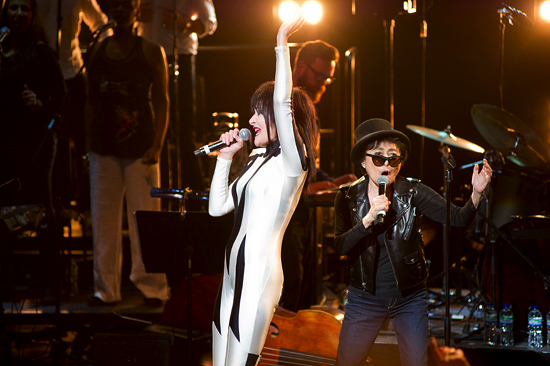
Yoko Ono & Siouxsie
Yoko Ono & John Lennon’s Double Fantasy Live
Royal Festival Hall, 23rd June
Over the course of about five years, between its release and my belated discovery of post-punk and new wave (long story, details irrelevant here), I must have listened to Double Fantasy a couple of hundred times. I haven’t intentionally heard it since. Before coming out to this show, I chose not to revisit it.
There’s a reason for that, and a reason why I mention it. Double Fantasy is, or was, an album inseparable from its context. Lennon came back; Lennon died. This is the music that soundtracked those conjoined events. I’d probably have played it week after week, fascinated, even if it had sounded like Alvin & The Chipmunks. Is it any good? I don’t recall. I remember almost every note, but I can’t trust my childhood opinions. And I didn’t want to go into this show still reassessing the record.
The show, you see, is A Thing to itself. They’ve got a choir. They’ve got Earl Slick, noted Bowie sideman and the most rock-guitarist-looking rock guitarist never to be a Rolling Stone, who played lead on the original album. They’ve got a selection of guest vocalists ranging from left-field aristocracy (Patti Smith) via proper pop stars (Boy George, Siouxsie) to trad stagers (Camille O’Sullivan). What they haven’t got, for the most part, is Yoko Ono, who cedes her songs to others for interpretation.
I say interpretation: Pete Molinari, who opens with ‘(Just Like) Starting Over’ and returns for ‘Woman’, opts for an impression – he repeats Lennon’s studio takes inflection for inflection. There’s a metaphor in there for how old-timey revivalists such as Molinari are all about turning music into a kind of antique replica shoppe, but little time to dwell on it, because here comes confrontational, my-way-or-the-highway avant-electro head Peaches, dressed as Barbarella, to sing ‘Kiss Kiss Kiss’ and… hang on, is she imitating Yoko’s inflection to a T? She is, you know.
The etiquette for these things seems to be: you wait for the previous number’s ovation to subside, then you walk on, politely and mutely accept your own applause – unless you’re Andrew Wyatt, and nobody’s sure whether you’ve wandered on to fix a microphone – do your turn, and leave. Only Patti Smith, with an air of "I am gracing this occasion", delivers a preamble, but then she’s never been one to deny herself her tuppen’orth.
The highlights are Patrick Wolf’s intense, torchy ‘Watching The Wheels’, O’Sullivan’s full-blooded ‘I’m Losing You’ – both of which underline the essentially vaudevillian nature of the do far more than the consciously campy quartet (O’Sullivan, Peaches, Lene Lovich, Bishi) on ‘Yes, I’m Your Angel’ – and an ideal meeting of singer and song between catsuited Siouxsie and ‘Walking On Thin Ice’.
The night is a fun and suitably daffy conclusion to Ono’s Meltdown curatorship. But it doesn’t make me think I’ve missed out by not returning to Double Fantasy all this time. And now I’m not sure I want to. I might prefer to remember it this way. David Bennun

